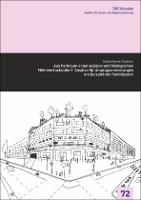Aus Parkraum einen sozialen und ökologischen Mehrwert schöpfen? Ansätze für Umprogrammierungen am Beispiel von Parkhäusern
Author(s)
Wanner Fandrych, Sophie
Collection
AG UniversitätsverlageLanguage
GermanAbstract
The negative effects of private motorized transport on cities, including the high land consumption for parking space, are now well known. Departing from the assumption that private car ownership must decrease and thus parking space will be liberated for other uses in the future, this bachelor thesis looks at how multi-story car parks as one type of parking space and an existing 'hardware' of the city can be reprogrammed for uses with a social and ecological added value. Following research on the history of parking and the role of car parks in German cities to date, selected experts were interviewed. Based on their assessment of the possibilities and limitations of these buildings for other uses, three scenarios for the reprogramming of multi-story car parks were developed. Each scenario is set in different hypothetical circumstances and proposes a particular focus, considering the interests of different stakeholders and suggesting instruments that might render conflicting interests compatible. The scenarios outline a flexible approach, informed by temporary and experimental uses which may evolve as societal demands change. They show how car parks can be employed to facilitate the transition to more sustainable urban mobility and how, as multifunctional entities, they could make a contribution to more walkable cities. The thesis suggests that car parks hold a potential for cities that has not yet been widely recognized and encourages that strategies for its realization be tested.
Keywords
parking; car park; reprogramming; conversion; car-friendly cityDOI
10.14279/depositonce-16733ISBN
9783798332775, 9783798332775Publisher website
https://verlag.tu-berlin.de/Publication date and place
Berlin, 2023Series
ISR Impulse, 72Classification
Urban and municipal planning and policy


 Download
Download Web Shop
Web Shop